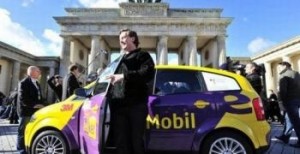The yellow and purple Audi A2 car took about seven hours to complete the 600 km (372 mile) stretch and arrived in the opulent court of the economy ministry in Berlin just before 8:00 local time (0600 GMT).
“If journalists want to recharge their iPhones, we still have some power again,” quipped driver Mirko Male Male, 27, as he stepped out of the four-door car to show off the battery.
Economy Minister Rainer Bruederle welcome the team on arrival, and was even tempted to take a spin around the yard, but not behind the wheel.
“They even had the heat on. It was really a luxury trip,” Bruederle told a lot of reporters and photographers on a cool Berlin morning.
At a later news conference, said Bruederle: “Welcome to a world before electric cars could usually only go 60 or 70 miles before charging, this is a technological leap forward …”
Car manufacturers hope that electric vehicles will grow to dominate the automotive industry, but consumers can see the short range of cars as a big disadvantage.
Japanese researchers have taken an experimental electric car more than 1,000 kilometers around a track, but the two German companies, leaking Energie and DBM Energy, said their vehicle was long gone with an everyday car.
Chancellor Angela Merkel’s government aims to have one million electric cars on the road by 2020, but Germany, the car giants have been slow from the starting field, and are now scrambling to catch up with their Asian rivals.
The world’s leading luxury car maker BMW and Europe’s largest manufacturer Volkswagen both have said they plan to launch its first cars in 2013.
Unlike last week, Japan’s Nissan said it had started mass producing its Leaf electric car and is ready to put it on sale both at home and in the United States.
Nevertheless, Berlin has offered sweeteners to jump start their national champions, and we hope that by 2050, gas-guzzle be a thing of the past.
“Let the message go out to the world. Germany is again a technological leader,” said Bruederle.



